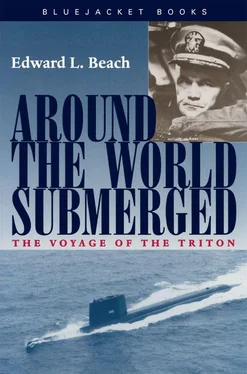Questions and problems were tumbling through my mind like an avalanche, and try as I might to concentrate on the important details of the planning, the most prominent thought in my mind, the one I could not cast aside, was “what in the world will I tell my wife?” Ingrid was not even in New London, having been called suddenly to California, where her father was again seriously ill. How, in fact, could I even ask her to come home without revealing that something special was going on?
At the conference it had been decided that the voyage would be classified; nothing was to be made known about it until its completion. If we failed for any reason, considerable thought would have to be given to precisely what sort of announcement would be released, if any. Obviously, in this event, our location and the circumstances would influence the decision. As everyone was quite aware, if we were to have an embarrassing failure, the effect would be a serious disservice to our national interests and to the prestige of the Navy. Again I could hear those portentous words: “We’re depending on you!”
“We’ll not fail!” I had told them determinedly. “We will get under way on the sixteenth of February, and return on the tenth of May, as scheduled.” No one volunteered an explanation as to why the timing—and secrecy—were so vital, and I did not ask.
Yet there was so much that my wife—and the other Triton wives—would have to be prepared for, and so little time.
Every man in our crew would have his problems, too, without the consolation of knowing what I knew. Their personal lives, thus, became my responsibility. How could I inform them before departure that we would be away much longer than expected, that no mail could be sent or received during the entire cruise, that they would have to make personal preparations for an unusually long absence, attending to income tax, automobile-license tags, insurance policies, payment of rent, arrangement for financial support—a thousand details?
It was more than a matter of crew morale; all but about forty of our crew were married, and all the officers but one. I had additionally been informed that about half-a-dozen civilian scientists with various specialties would be placed aboard to help us accumulate the desired data. None of them was to be informed of the basic purpose of the cruise or its duration. This was to be left to me, after we had gotten under way. Providing for these men (whom I didn’t know and hadn’t met, and would not meet until the day before we left) and their families was to be my responsibility also.
As the train rattled north toward New York and New London, I mentally discarded one scheme after another. With some misgiving, I finally resolved to announce that an unknown bureaucrat in Washington had so fouled up our shakedown cruise schedule that we would have to proceed directly from the North Atlantic into the Caribbean for special tests requested by the Bureau of Ships. “Unknown bureaucrats” for years have been blamed for things that have gone wrong, especially when the complaining parties do not care to be too specific about placing the blame. For years I had seen this happen and had defended the unknown bureaucrat whenever I had an opportunity. Now, I was about to add to the ridicule heaped on the Washington civil servant, despite the fact that he works harder and gets less thanks than perhaps anyone else in the country.
As a result of this nameless bureaucrat’s inefficiency, we would not be able to send or receive mail at any time, I would tell my people, and hence (here was the kicker) a list of “things to do” (which included all preparations for a long voyage) would be given to all hands. In the name of efficiency, each man would be required to return a signed copy of the list, attesting to his having carried out all the various instructions.
This was, of course, far from my only problem. The idea of diverting slightly from our cruise to visit the place where Magellan died had met with approval, and someone had proposed, in addition, that as Triton passed near Spain she should pause momentarily to render homage to that famous and unfortunate navigator. This, too, had met with favor, as did the idea of a commemorative gift to Spain in his honor.
The Navy, however, has no budget for such commemorations, but I had told the conference that Triton herself would somehow design and finance the casting of an appropriate plaque. It had to be big, as befits a gift from one nation to another, but small enough to fit through our hatches; it had to be memorial in nature, in keeping with the intent; and it had to be something that both Spaniards and Americans could henceforth look at with pride.
Another problem was to obtain adequate charts, in secrecy, and to lay out our course in meticulous detail in advance, so that the Navy would always know precisely where we were. Our track was to be some thirty-four thousand nautical miles, in itself a fantastic plotting job, and this, too, had to be done surreptitiously!
As for the necessary provisions, submarines have had years of experience in preparing for long cruises, though never for one so long as this. Triton had been designed to carry food supplies for seventy-five days, and we knew her huge hull could easily carry more. Arbitrarily, I resolved to increase this by at least a half, and directed that the ship be provisioned for one hundred and twenty days. If worst came to worst, and a long extended cruise became necessary, we could go on half-rations and stretch the voyage to six months.
There was the scientific equipment to get ready, also. Most of it would be sent to us by the Navy, but it was up to Triton to decide where it was to be stowed and to make special arrangements for the installation of whatever foundations, telemetering circuits, and remote controls were needed. A whole package had to be prepared without spilling the beans to anyone.
At 5:45 A.M., when I finally stepped off the train in New London, with sheets of notes in my hand, I realized fully that there were but twelve days left in which to get ready.
4

By the fifteenth of February, most of the problems had been solved, and we were nearly ready to begin the voyage. The last eleven days had been crammed with work. Les Kelly, our inspired engineer who had put the ship through her trials, had made his envious good-byes. Commander Will Adams and Lieutenant Commander Bob Buhner, Executive Officer and Operations Officer respectively, had spent most of their time in ComSubLant’s locked chart room plotting our course. With them was the only enlisted man to be informed of the real nature of our trip, Chief Quartermaster William J. Marshall, Adams’ navigational assistant.
The secret of our voyage was not, in the end, kept from Triton ’s officers. After much thought, I got them together and told them, holding back only the indicated super-importance of getting back on time. There was simply too much to be done for them to be kept in the dark; we had to spread our work in too many different directions at once. Except for Marshall, neither Triton ’s crew nor the passengers who came aboard a day or so before our departure could be told anything. An announcement had been made that we would be under way for a much longer time than originally scheduled, using my bureaucrat as an excuse. All hands had been advised that our Squadron office—the headquarters of Submarine Squadron 10, to which Triton belonged—would be glad to assist in all personal emergencies, and men expecting additions to their families were especially told to notify the Squadron. A broad hint was given out that strictly personal information pertaining to family increases might find its way into official radio traffic, as it had during the war.
Читать дальше













